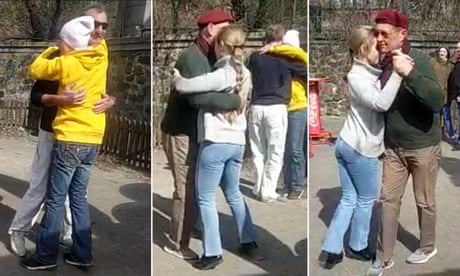- by foxnews
- 03 Apr 2025
Kyiv’s tango partners refuse to let war slow passion for dancing
Kyiv’s tango partners refuse to let war slow passion for dancing
- by theguardian
- 10 Apr 2022
- in news

Air raid sirens were near constant and Russian troops were on the outskirts of the city, but that didn't stop some people in Kyiv from dancing.
A group of Ukrainian tango dancers wrapped up warm against the freezing weather to meet in the botanic gardens: they circled around each other to an Argentinian milonga, embracing and laughing with relief to see those around them were still alive.
A video of the event posted to social media delighted people across the country struggling with their bleak new reality. "We didn't plan to dance, it just happened," said Valentina Belyaeva, 43, an active member of Kyiv's latin dance scene. "The soldiers around were a bit wary at first but they let us keep going. We were just so happy to see everyone alive and well."
A vicious war is still raging. As the Kremlin's ground forces have pulled back from towns and villages surrounding the capital to refocus on the east of the country, horrifying evidence of war crimes against civilians is coming to light.
Yet signs of life were trickling back into the capital this week: every day brought more people on the streets, more cars on the roads, and more businesses and cafes opening their doors.
On Saturday, Belyaeva is looking forward to hosting the first milonga since the conflict broke out at Art Prychal, a dance hall on the banks of the Dneiper, the vast river that runs through the heart of Kyiv.
"In summer we are out here dancing until 5am. It's a beautiful spot," Belyaeva said. "But we are going to dance regardless, war or no war."
While Paris and Istanbul are known as the tango capitals of Europe, Kyiv boasts a surprisingly large and vibrant latin dance community for a city home to 3 million people. In more normal times, about 400 regulars show up for different milonga evenings each week.
Kyiv hosted its first international milonga festival last October, which attracted visitors from all over the world, and Belyaeva and her husband Oleksiy are still planning to go ahead with another event planned for May.
Milonga is a faster, more relaxed and sociable form of traditional tango, in which dancers swap partners after every tonda, or turn. It involves a tighter embrace of partners, and quicker dance steps, echoing the more staccato rhythms of the lively, almost waltz-like music.
Belyaeva fell in love with it 15 years ago, when looking to try out new things after a divorce. She met Oleksiy, her second husband, through dancing.
"There's a saying in tango," she said, while walking arm in arm with him along the Dniper. "Tango brings children."
For Sergio Omelyanenko, tango has been his whole life. Before the pandemic, and before the war, he was dancing professionally as well as giving two or three lessons a day either at a dance school or privately. To his surprise, many clients got in touch even after Russia invaded in February, still keen to learn.
"I guess people need to do something with their bodies and occupy their brains, instead of 24/7 reading the news and worrying," he said in an interview at his teaching studio in Pechersk in central Kyiv.
Dancing is an opportunity for people to connect with and explore their emotions, the 23-year-old said. "I think the stereotype is that tango is just about romantic love, but really, it's about having a conversation with your partner. It's very social," he said. "You share what you feel. Hunger, pain, suffering, you find it in tango."
Omelyanenko estimates around half of his friends and clients have left the city, but what remains of Kyiv's tango community is looking forward to Saturday night's event. For many who decided not to flee the Russian advance, staying, and living life to its fullest, are acts of resistance in themselves.
"I have friends in Russia, my wife is from Belarus. In those places, you can't speak freely, you'll go to prison. Ukraine fought for freedom in 2014," he said, referencing the popular uprising that brought down the country's pro-Russian government.
"Ukrainians know freedom is the most important feeling. Staying, dancing, enjoying life, is about protecting that."
- by foxnews
- descember 09, 2016
Flight passenger says man deliberately squatted in window seat, ignites social media debate
An airline flyer said a seat squatter tried to tell her to swap seats with him, but she stood her ground, prompting a social media debate. A travel expert weighs in.
read more


